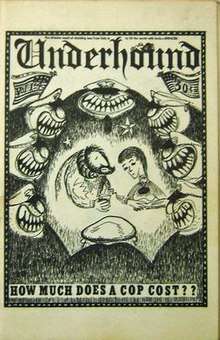Chester Anderson
Chester Valentine John Anderson (August 11, 1932 - April 11, 1991) was a novelist, poet, and editor in the underground press. Raised in Florida, he attended the University of Miami from 1952 to 1956, before becoming a beatnik coffee house poet in Greenwich Village and San Francisco's North Beach. As a poet, he wrote under the name C.V.J. Anderson and edited the little magazines Beatitude and Underhound. In journalism, he specialized in rock and roll. In that area, he was a friend of Paul Williams and edited Crawdaddy! for a few issues in 1968-1969.
Chester Valentine John Anderson | |
|---|---|
| Born | August 11, 1932 Stoneham, Massachusetts, United States |
| Died | April 11, 1991 (aged 58) |

He also wrote science fiction, because of Michael Kurland. Anderson's The Butterfly Kid is the first part of what is called the Greenwich Village Trilogy, with Kurland writing the second book (The Unicorn Girl) and the third volume (The Probability Pad) written by T.A. Waters. The novel was nominated for the 1968 Hugo Award for Best Novel. It, and his few other genre works are associated with New Wave science fiction.
He was also a gifted musician, played two part inventions with two recorders simultaneously, played duets with Laurence M. Janifer at the Cafe Rienzi. He subsequently moved to San Francisco during the Summer of Love and, along with Claude Hayward, was one of the founders of the Communications Company (ComCo), the "publishing arm" of the anarchist guerrilla street theater group The Diggers,[1] having bought a mimeograph with his second royalty check from Butterfly Kid.[2] Through ComCo, he circulated a number of his own bitter broadside polemics in the Haight, including "Uncle Tim's Children," with its infamous, often quoted line, "Rape is as common as bullshit on Haight Street."[3] Joan Didion described the role Chester Anderson and ComCo played in Haight-Ashbury in her 1968 book Slouching Towards Bethlehem.
After his stint with Crawadaddy! he was connected for a brief period with the underground newspaper Tuesday's Child and with Peace Press, a small movement print shop in Los Angeles. He published two works, both of them thinly disguised memoirs (one under the pseudonym John Valentine) with Paul Williams's Entwhistle Books. Prior to his death in 1991, he lived for a number of years in Mendocino, California, where he collaborated with local artist Charles Marchant Stevenson on his book Fox and Hare: The Story of a Friday Evening. A number of science fiction and publishing personalities, including Norman Spinrad and Lou Stathis, posed on location for the illustrations in this book, which attempted to recreate a particular evening in Greenwich Village in the 1960s.
Bibliography
- Colloquy (poems) (1960)
- A Liturgy for Dragons (poems) (1961)
- The Pink Palace (1963)
- Ten Years to Doomsday (with Michael Kurland) (1964)
- The Butterfly Kid (1967)
- Puppies (1979) (as John Valentine)
- Fox and Hare (illustrated by Charles Marchant Stevenson) (1980)
Further reading
- "Chester Anderson," Contemporary Authors Online, Farmington Hills, MI: Thomson Gale. Online. GaleNet. Accessed 12-12-2006.
- The Encyclopedia of Science Fiction, page 29.
- Anderson, Chester. "Forward", The Butterfly Kid (Pyramid Books, 1967). Stolen Apples - Arts Blog. 08-28-2009. Accessed 06-17-2010.
- Dryer, Thorne. "Les marchands", Anarchisme et non-violence, n°11/12 (janvier/février 1968). La Presse Anarchiste. 10-30-2007. Accessed 06-17-2010.
- Williams, Paul. "Introduction: the making of Fox & Hare". Excerpts. Accessed 06-17-2010.
- Braunstein, Peter & Doyle, Michael William. "28. Chester Anderson", Imagine nation: the American counterculture of the 1960s and '70s. Routledge. 2001. Page 98. Accessed 06-17-2010.
References
- "The Communication Company -- Publishing Arm of the Diggers". "The Diggers Archive". Archived from the original on 2010-12-07. Retrieved 2010-12-07.
- Anderson, Chester. "Letter To Thurl" Chester Anderson (1932- ) Papers (ca. 1963-1980). Accessed 03-31-2011
- "Com/Co Biblio". diggers.org. Retrieved 2017-07-25.